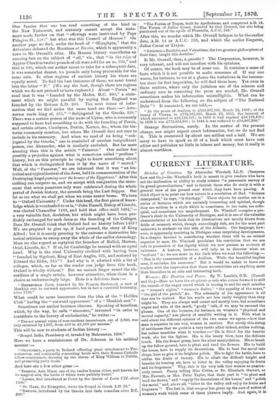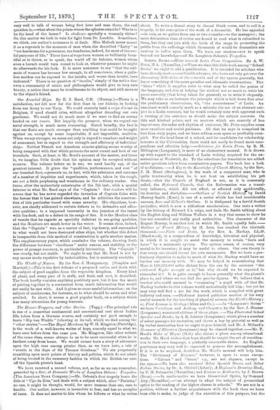Woman: Her Position and Power. By W. Landels, D.D. (Cassell
and Co.)—Here we have the virpietate gravis who comes forward to still
the tumult of the angry crowd which is tossing to and fro such missiles
as "woman's rights," "woman's duties," "the equality of the sexes," "the girl of the period," dce. The solemnity of his appearance is all
that can be desired. But his words are less really weighty than they might be. They are always well meant and mostly true, but sometimes vague and wide of the mark, " goody " talk, if we may be excused the
phrase. One of the lectures, for instance, on woman's "physical and mental capacity," has plenty of sensible writing in it. With what is- said about the different spheres of the two sexes we agree,—how that man is superior in one way, woman in another. But surely this string of antitheses that we quote is a very feeble affair indeed, settles nothing, but rather unsettles what it touches :—" He is fitted for the heavier work, she for the lighter. His is the heavy blow, hers the delicate touch. His the firmer grasp, hers the nicer manipulation. Hia to break up the fallow ground, hers to plant and tend the flowers. His to build the house, hers to supply its decorations. His to beat the metal into' shape, hers to give it its brighter polish. His to fight the battle, hers to utilize the fruits of victory. His to climb the difficult height and breathe its bracing air, hers to loiter in the valley enjoying its fruits and its fragrance." Why, this is the very talk that women so paivaion- ately resent. Fancy telling Miss Cobbe, or Dr. Elizabeth Garrett, or Mrs. Fawcett, or Mrs. Peter Taylor, that their part is "to plant and tend the flower," and "supply the decorations of the house," and "polish the metal," and, above all, "loiter in the valley and enjoy its fruits and fragrance "! The fact is, that everyone has given up the sort of notion of woman's work which some of these phrases imply. And again, it is very well to talk of woman being first here and man there, the real question is,—what about the points where the spheres coincide ? Who is to be the head of the house? Is obedience specially a womanly virtue? On this matter we look in vain for light from Dr. Landols. Sometimes, we think, our author's acuteness is at fault. Miss Maio& never meant it as a reproach to the manners of men when she described " Letty " as "too handsome for a governess, too handsome, indeed, for moat of the use- ful purposes of life." There have always been women so brilliantly beau- tiful as to throw, so to speak, the world off its balance, women whom even a hermit would turn round to look at, whatever penance he might do afterwards for his look. It is mere nonsense to say " that the esti- mate of women has become low enough, in all conscience, when a guile- less maiden can be exposed to the insults, and worse than insults, here indicated." There is no question of "insults," simply of the notice that even a community of saints and philosophers would give to very rare beauty, a notice that must be troublesome to its object, and still more so to the object's friend.































 Previous page
Previous page